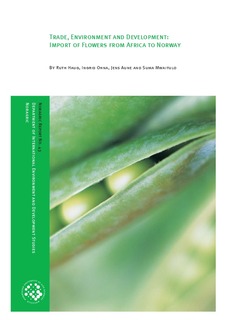| dc.contributor.author | Haug, Ruth | |
| dc.contributor.author | Ohna, Ingrid | |
| dc.contributor.author | Aune, Jens B. | |
| dc.contributor.author | Mwaitulo, Suma | |
| dc.coverage.spatial | Norway | nb_NO |
| dc.date.accessioned | 2020-01-30T12:05:42Z | |
| dc.date.available | 2020-01-30T12:05:42Z | |
| dc.date.issued | 2008 | |
| dc.identifier.issn | 1502-8127 | |
| dc.identifier.uri | http://hdl.handle.net/11250/2638860 | |
| dc.description | This Noragric Report was commissioned by the Norwegian Agency for Development Cooperation (NORAD) to Noragric. | nb_NO |
| dc.description.abstract | The purpose of this study is to asses to what degree and how it is possible to increase import of agricultural products from low income sub-Saharan African countries to Norway by benefiting from zero tariffs, and in a way that is environmentally sustainable and contributes towards poverty reduction. Mester Grønn is selected as a case because Mester Grønn has been able to utilise the zero tariff advantage for import of agricultural products granted to least developed countries (LDC) in July 2002. The import of roses from Africa to Norway has increased substantially during the last years, one important reason being Mester Grønn. Mester Grønn successfully imports 98% of its roses from Africa. The rose production creates income opportunities that contribute towards improved livelihoods of poor men and particular women in Africa. Roses produced in Tanzania and transported to Norway by air also have lower emissions than roses produced and sold in Norway. This study assesses reasons why the import of African roses by Mester Grønn has been a success and what lessons can be learned for import of other agricultural products from Africa to Norway. The study concludes that in order to reach the Norwegian market, low-income African countries need to find partners in Norway who are willing to invest in the whole market chain from production to consumer, either on their own or by linking with other professional actors. The Norwegian government could provide better incentives to Norwegian agro-business to team up with partners in low-income African countries. To the degree that it is possible to find ways of having both farmers and the private sector in Norway and in low-income African countries benefit from collaboration and increased import to Norway, the prospects for success will be greater. | nb_NO |
| dc.language.iso | eng | nb_NO |
| dc.publisher | Norwegian University of Life Sciences, Ås | nb_NO |
| dc.relation.ispartofseries | Noragric report;43 | |
| dc.rights | Attribution-NonCommercial-NoDerivatives 4.0 Internasjonal | * |
| dc.rights.uri | http://creativecommons.org/licenses/by-nc-nd/4.0/deed.no | * |
| dc.title | Trade, environment and development : import of flowers from Africa to Norway | nb_NO |
| dc.type | Report | nb_NO |
| dc.subject.nsi | VDP::Agriculture and fishery disciplines: 900::Agriculture disciplines: 910::Plant breeding, horticulture, plant protection, plant pathology: 911 | nb_NO |
| dc.subject.nsi | VDP::Social science: 200 | nb_NO |
| dc.source.pagenumber | 37 | nb_NO |

